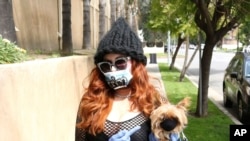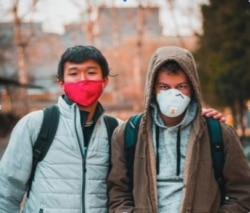Face masks ... as a fashion statement?
With the recent COVID-19 spread in the United States, people wearing surgical masks in public has become a common sight. But this phenomenon has long been a norm in Asia, where face masks are often worn regardless of whether the person is ill.
"It's very common in Asia, especially amongst young people," said Pooh Chandanamattha, a Thai student studying at International Christian University in Tokyo.
Americans have been slow to embrace face masks, even as the coronavirus outbreak has expanded quickly. The Centers for Disease Control and Prevention recommended against routine use of masks outside the workplace until this week.
The World Health Organization warned to save masks for health care workers.
But in Asia, there has been an underlying cultural narrative as to why people wear masks.
"Face mask culture" in Asia originated in Japan, as the country grappled with the Spanish flu outbreak in 1918. About 100 years later, face mask culture prevails in Japan and many other Asian countries.
"For most, wearing a mask is a sense of security. Since Japanese people value reputation and 'face' so much, knowing that your face is covered helps them feel safe from judgment," Chandanamattha said.
Sometimes, the face mask can act as a social firewall, similar to wearing headphones.
"One of my professors even mentioned that students with masks tend to use it to avoid answering questions, because when your face is hidden, your presence isn't as noticeable," Chandanamattha added.
In South Korea and China, it is common to see people wearing face masks when microdust, or fine dust, levels are high, to prevent tiny air pollutants from being inhaled.
"I wore masks even before the coronavirus outbreak because the air pollution from microdust is so bad here," said Hyo Jeong Bae, a senior studying at Kongju National University in South Korea.
In addition to the microdust, Bae said it is common in South Korea, like Japan, to see students wearing masks to "hide" their face and attract less attention from people.
"There is a 'lookism' culture in South Korea, so students, especially female students, will use the mask to hide their face when they don't have any makeup on," said Bae.
Face masks have also acted as accessories for youth. Some are sold in a variety of colors and designs, which can be a fashionable complement to an outfit.
"A lot of Asian celebrities wear masks to hide their face from the public. So, I feel like that also influenced it to become a fashion trend," said Jessica Muh, a recent graduate of Kennesaw State University in Georgia.
Heasu Lee, a Korean student studying at George Mason University in Virginia, said "face mask fashion" is a trend among Asian youth.
"I think following trends is a pretty big thing in South Korean culture. There was a time when wearing face masks just on your chin was a trend amongst Korean high school students. So, in a sense, I think face masks can also be seen as a fashion trend and not just for protection."
With the face mask culture ingrained into Asian culture, not much has changed in Asia other than a visible increase of people wearing face masks in public because of COVID-19.
"You can't go out anywhere without a face mask right now. Even though you don't think you'll get coronavirus, it's still seen as good manners to wear a mask for the sake of not infringing any discomfort to other people," said Bae.







